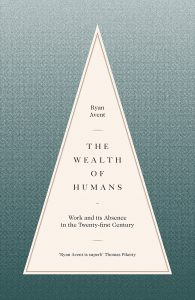As one would of course expect from the economics correspondent of The Economist, Ryan Avent has written a very clear account of the way digital technologies, and the globalisation driven in part by technology, is changing the ways people can earn a living. The Wealth of Humans: Work and its Absence in the 21st Century brings together the debate about robots destroying jobs, arguments about the ‘death of distance’ and literature on the re-emergence of cities as economic hubs, the issue of inequality, and the more recent discussion of whether or not the world is in for an era of ‘secular stagnation’. The focus is on three related trends: automation, globalization, and the enhanced productivity of a highly skilled minority of people.

It ends up being a rather pessimistic synthesis. The starting point is unarguable: “Society must go through a period of wrenching political change before it can agree on a broadly acceptable social system for sharing the fruits of this new technological world.” A few years ago this would have seemed hyperbole, but no more. And yet the rest of the book tends to suggest that this political change cannot happen. Essentially, Avent does not believe enough people can become educated or skilled enough to share the benefits of automation and globalisation with those happy few whose cognitive skills have made their incomes increase. He does not think as many as 50% can complete tertiary education. “The proportion of highly educated workers to less educated workers is no longer going to grow in the growth-boosting, inequality-dampening way it once did.”
Part of this, I’d take issue with. I don’t agree that skill upgrading has ‘run out of steam’. The character of tertiary education clearly needs to change; we are in a stage like the persistence of classical education in the late 19th century. The educational establishment is slow to change – but it will, or it will be disrupted. But I’m much more persuaded by James Bessen’s argument (in Learning by Doing) that in the later stages of the technological transformation of production, the necessary skills are steadily standardised and thus able to be codified and taught. And, while addressing the ‘lump of labour’ fallacy, Avent nevertheless argues that, “The problem is the sheer abundance of labour.” Yet he also sees technology replacing ‘expensive’ labour. Surely labour=people=knowledge, pretty key in an endogenous growth, knowledge-based economy. It seems more likely that ‘work’ will be redefined, with a role for appropriately skilled humans, as it has been so many times before.
There are some very nice details indeed in the book. I didn’t know that Robert Gordon used to ask audiences whether they would rather give up post-2000 technology or indoor plumbing – the answer used to be the former, until smartphones came along. And indeed in the developing world, people would clearly rather have their phones and the internet. (An aside: indoor plumbing is a great example of why technology is social more than it’s technological. It’s a simple and well-known technology, yet one many countries are unable to make work for them.) Arvind Subramanian’s term ‘fluff not stuff’ for weightlessness (cf The Weightless World) was new to me, although perhaps a little too derogatory-sounding for the source of most of the value-added in developed economies.
Avent concludes that the reason to be pessimistic is that there is ‘no-one in control’, able to pilot society wisely through the upheaval. Looking back over the past 200 years, someone thinking they are ‘in control’ seems a pretty bad idea to me. But, to get back to the starting point, the politics, I’d agree that this is the territory for pessimism. Where leadership to generate a sense of progress and confidence would be desirable (because expectations matter no end for the economy), we have politicians reacting to people’s fears. It’s understandable, but it isn’t what we need.

